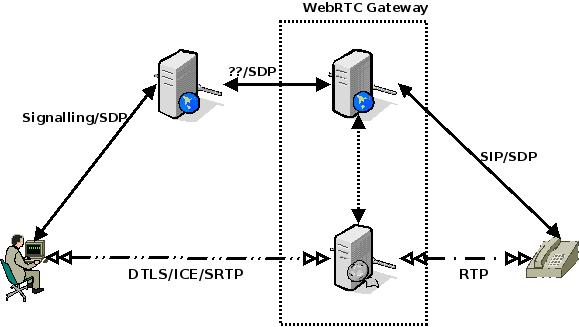WebRTC-SIP gateways translate the signaling and media between WebRTC and SIP endpoints to allow interconnections between these protocols.
- WebRTC is the abbreviation for Web Real-Time Communication and means a collection of API and protocols allowing real-time collaboration for web browsers and native WebRTC applications such as voice calls, video calls, file transfer, instant messaging and screen sharing.
- SIP is the abbreviation for Session Initiation Protocol and means a communications protocol for signaling to control media communication sessions, often used together with RTP to carry the media streams.
A WebRTC gateway core functionality is to provide conversions between these protocols which is required if a party understand only one of these and the other party only the another one. For example:
- Common browsers has full plugin-free support for WebRTC but no any support for native SIP/RTP (because of the browser sandbox restrictions it is impossible to connect and send packets from a browsers via plan TCP or UDP which is required for SIP/RTP).
- On the other side, most common VoIP servers (softswitch, IP-PBX) nowadays comes with a robust SIP core but no WebRTC capabilities or their WebRTC support is very poor with various bugs, incompatibilities and sub-optimal NAT/firewall handling which is not suitable for corporate customers.
Thus the need for WebRTC-SIP gateways to convert between these worlds.

The main tasks performed by a WebRTC-SIP gateway are the followings:
- handle SIP signaling from HTTP/TCP based websocket and converts it to plain UDP SIP signaling
- handle media from WebRTC in DTLS/SRTP and convert it to plain RTP over UDP
- handle ICE negotiations
Optional features of a WebRTC-SIP gateway include the followings:
- built-in STUN and TURN servers (otherwise these needs to be installed separately and fine-tuned to match your network needs)
- codec transcoding capabilities
- intelligent media relay via local UDP and TCP candidates to ensure proper functionality for NAT restricted networks and clients behind firewalls
- SBC and security features to protect your network
- extra services for features which can’t be directly translated between WebRTC and SIP such as file transfer or conference
- monitoring, routing, alerting and other management services
WebRTC-SIP gateway solutions:
There are a few commercial and open-source solutions available with varying quality:
- MRTC an all-in-one WebRTC to SIP gateway software (with built-in TLS, TURN and media relays)
- webrtc2sip a modularized solution from Doubango (requires separate TURN server and manual text config)
- Reve WebRTC from Reve systems (requires sign-up, not tested)
- squire SBC is an SBC named ABC gateway (but has also WebRTC capabilities)
- PortSIP webrtc gateway with SIP conversion capabilities (from the company with the same name)
- Janus is a general purpose SIP gateway (with support for protocols like SCTP and message queues)
External links and resources:
You can find more details about WebRTC-SIP gateways on the below lins:
- A good description about how a WebRTC-SIP gateway works can be found on the MRTC homepage here
- A general description about WebRTC gateways (not SIP specific) can be found here.
- You can find a more technical details about WebRTC-SIP gateways here
Mizutech WebRTC-SIP solutions:
Mizutech offers
WebRTC-SIP gateway solutions for both small (small-business) or large (enterprise) networks and also a broad range of other professional
WebRTC-SIP software solutions.